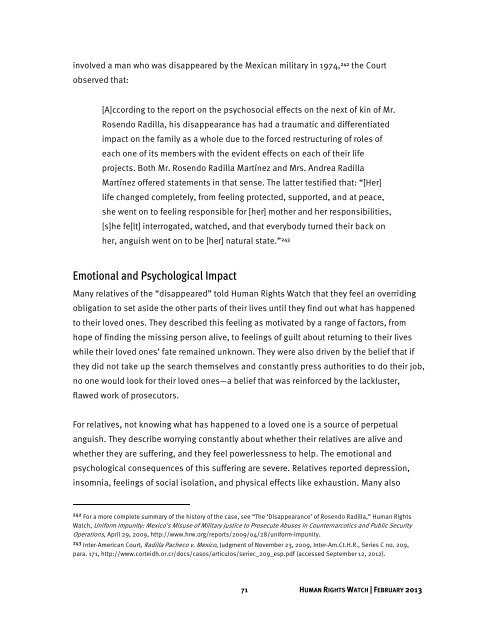Download the full report - Human Rights Watch
Download the full report - Human Rights Watch
Download the full report - Human Rights Watch
Create successful ePaper yourself
Turn your PDF publications into a flip-book with our unique Google optimized e-Paper software.
involved a man who was disappeared by <strong>the</strong> Mexican military in 1974, 242 <strong>the</strong> Court<br />
observed that:<br />
[A]ccording to <strong>the</strong> <strong>report</strong> on <strong>the</strong> psychosocial effects on <strong>the</strong> next of kin of Mr.<br />
Rosendo Radilla, his disappearance has had a traumatic and differentiated<br />
impact on <strong>the</strong> family as a whole due to <strong>the</strong> forced restructuring of roles of<br />
each one of its members with <strong>the</strong> evident effects on each of <strong>the</strong>ir life<br />
projects. Both Mr. Rosendo Radilla Martínez and Mrs. Andrea Radilla<br />
Martínez offered statements in that sense. The latter testified that: “[Her]<br />
life changed completely, from feeling protected, supported, and at peace,<br />
she went on to feeling responsible for [her] mo<strong>the</strong>r and her responsibilities,<br />
[s]he fe[lt] interrogated, watched, and that everybody turned <strong>the</strong>ir back on<br />
her, anguish went on to be [her] natural state.” 243<br />
Emotional and Psychological Impact<br />
Many relatives of <strong>the</strong> “disappeared” told <strong>Human</strong> <strong>Rights</strong> <strong>Watch</strong> that <strong>the</strong>y feel an overriding<br />
obligation to set aside <strong>the</strong> o<strong>the</strong>r parts of <strong>the</strong>ir lives until <strong>the</strong>y find out what has happened<br />
to <strong>the</strong>ir loved ones. They described this feeling as motivated by a range of factors, from<br />
hope of finding <strong>the</strong> missing person alive, to feelings of guilt about returning to <strong>the</strong>ir lives<br />
while <strong>the</strong>ir loved ones’ fate remained unknown. They were also driven by <strong>the</strong> belief that if<br />
<strong>the</strong>y did not take up <strong>the</strong> search <strong>the</strong>mselves and constantly press authorities to do <strong>the</strong>ir job,<br />
no one would look for <strong>the</strong>ir loved ones—a belief that was reinforced by <strong>the</strong> lackluster,<br />
flawed work of prosecutors.<br />
For relatives, not knowing what has happened to a loved one is a source of perpetual<br />
anguish. They describe worrying constantly about whe<strong>the</strong>r <strong>the</strong>ir relatives are alive and<br />
whe<strong>the</strong>r <strong>the</strong>y are suffering, and <strong>the</strong>y feel powerlessness to help. The emotional and<br />
psychological consequences of this suffering are severe. Relatives <strong>report</strong>ed depression,<br />
insomnia, feelings of social isolation, and physical effects like exhaustion. Many also<br />
242 For a more complete summary of <strong>the</strong> history of <strong>the</strong> case, see “The ‘Disappearance’ of Rosendo Radilla,” <strong>Human</strong> <strong>Rights</strong><br />
<strong>Watch</strong>, Uniform Impunity: Mexico's Misuse of Military Justice to Prosecute Abuses in Counternarcotics and Public Security<br />
Operations, April 29, 2009, http://www.hrw.org/<strong>report</strong>s/2009/04/28/uniform-impunity.<br />
243 Inter-American Court, Radilla Pacheco v. Mexico, Judgment of November 23, 2009, Inter-Am.Ct.H.R., Series C no. 209,<br />
para. 171, http://www.corteidh.or.cr/docs/casos/articulos/seriec_209_esp.pdf (accessed September 12, 2012).<br />
71 HUMAN RIGHTS WATCH | FEBRUARY 2013

















